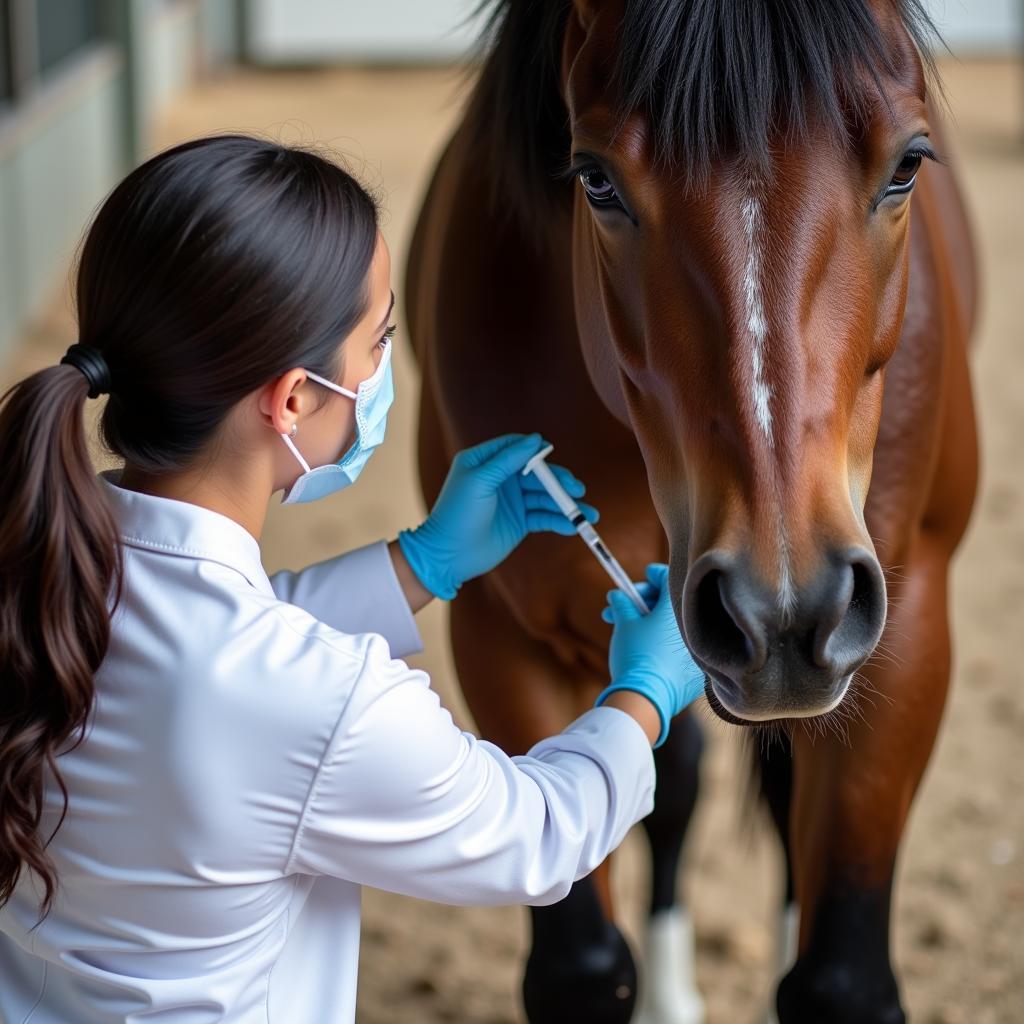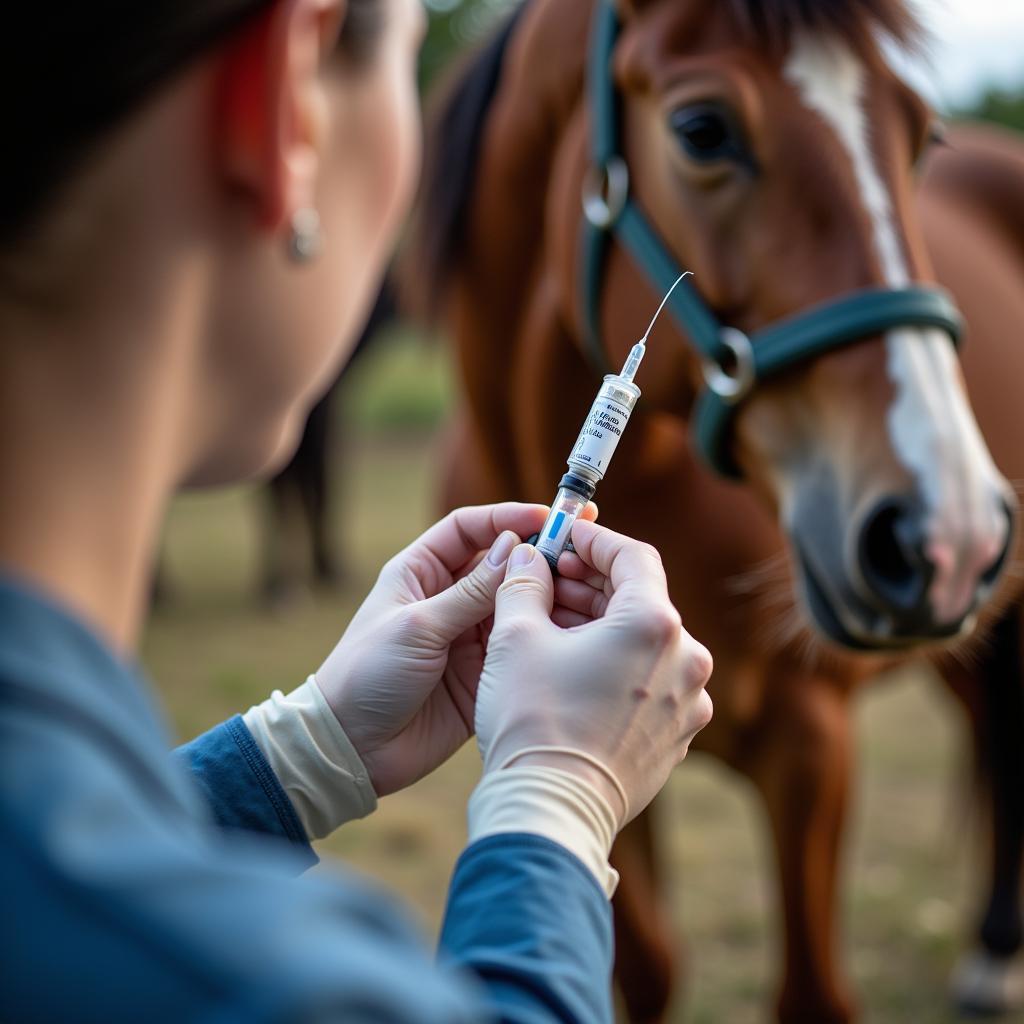Chorulon For Horses is a hormonal medication used primarily for the management of specific reproductive issues. Understanding its uses, benefits, and potential risks is essential for horse owners and breeders. This comprehensive guide will delve into everything you need to know about Chorulon, empowering you to make informed decisions about your horse’s reproductive health.
Understanding Chorulon and Its Uses in Horses
Chorulon, also known as human chorionic gonadotropin (hCG), is a hormone that mimics the effects of luteinizing hormone (LH) in horses. LH plays a crucial role in the reproductive cycle, triggering ovulation in mares and stimulating testosterone production in stallions. Therefore, Chorulon is used in a variety of reproductive management scenarios. In mares, it’s commonly used to induce ovulation, treat ovarian cysts, and manage certain hormonal imbalances. For stallions, Chorulon can help diagnose cryptorchidism (undescended testicles) and treat certain testicular conditions. It is important to consult with a veterinarian before administering Chorulon, as its use must be tailored to the individual horse’s needs and condition.
 Chorulon Injection for Mares
Chorulon Injection for Mares
Benefits of Chorulon for Horse Reproduction
Chorulon offers several benefits in managing horse reproduction. Its ability to induce ovulation allows breeders to better control the timing of breeding, which is particularly useful for artificial insemination or embryo transfer programs. By triggering ovulation at a specific time, breeders can increase the chances of a successful pregnancy. In addition, Chorulon can effectively treat certain ovarian cysts in mares, restoring normal ovarian function and improving fertility. For stallions, Chorulon can aid in diagnosing cryptorchidism by stimulating testosterone production, making it easier to locate undescended testicles.
“Chorulon has become an invaluable tool in my practice,” says Dr. Emily Carter, DVM, specializing in equine reproduction. “Its ability to precisely control ovulation timing has significantly improved our breeding success rates.”
Potential Risks and Side Effects of Chorulon in Horses
While Chorulon can be highly beneficial, it’s essential to be aware of the potential risks and side effects. Some mares may experience mild discomfort or swelling at the injection site. In rare cases, allergic reactions can occur, manifesting as hives, swelling, or difficulty breathing. Overuse of Chorulon can lead to the development of antibodies against hCG, reducing its effectiveness in the future.
 Chorulon for Stallions
Chorulon for Stallions
When Should You Consider Chorulon Injection for Horses?
chorulon injection for horses should be considered when specific reproductive issues arise, such as difficulty conceiving, irregular cycles, or ovarian cysts. It’s crucial to consult with a veterinarian to determine if Chorulon is the appropriate treatment option for your horse’s specific situation. They will conduct a thorough examination and assess the horse’s overall health and reproductive status before recommending Chorulon.
“Remember, every horse is different,” adds Dr. Sarah Miller, PhD, equine reproductive specialist. “A thorough veterinary examination is crucial to determine the appropriate dosage and treatment plan for Chorulon.”
Conclusion: Making Informed Decisions about Chorulon for Your Horse
Chorulon can be a valuable tool in managing horse reproduction, offering benefits for both mares and stallions. However, it’s crucial to understand its uses, benefits, and potential risks before administering it. Consulting with a veterinarian is essential to ensure the safe and effective use of Chorulon for your horse’s specific needs. By making informed decisions based on veterinary guidance, you can contribute to your horse’s reproductive health and overall well-being.
FAQ
- What is the typical dosage of Chorulon for horses? The dosage varies depending on the horse’s condition and should be determined by a veterinarian.
- How is Chorulon administered? Chorulon is typically administered via intramuscular injection.
- How long does it take for Chorulon to take effect? The onset of action can vary but is typically within a few days.
- Are there any alternative treatments to Chorulon? Yes, depending on the specific condition, alternative treatments may be available.
- Can Chorulon be used in pregnant mares? Chorulon should not be used in pregnant mares.
- What are the signs of an allergic reaction to Chorulon? Signs may include hives, swelling, or difficulty breathing.
- How often can Chorulon be administered? The frequency of administration should be determined by a veterinarian.
Common Scenarios Where Chorulon is Used:
- Inducing ovulation in mares for timed breeding.
- Treating ovarian cysts in mares.
- Diagnosing cryptorchidism in stallions.
Further Reading and Resources:
- Chorulon injection for horses
- Check out our other articles on equine reproductive health on JustusHorsesUSA.com.
Contact us for assistance: Phone: 0772127271, Email: [email protected] Or visit us at: QGM2+WX2, Vị Trung, Vị Thuỷ, Hậu Giang, Việt Nam. We have a 24/7 customer service team.